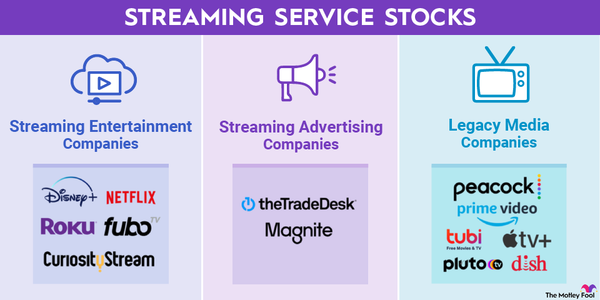Media companies produce and distribute films, television series, music, books, news, and radio programming. The public is consuming more and more of their offerings every year. The proliferation of mobile devices and digital media organizations has greatly increased screen time over the past decade, and the coronavirus pandemic only accelerated the trend. The average American now spends more than 13 hours per day consuming or interacting with some form of media as the use of connected TV and mobile devices continues to grow.
Companies with a strong foothold in digital media keep expanding their consumer engagement, while legacy businesses that rely heavily on older media formats are struggling. As a result, the industry has experienced a lot of mergers and acquisitions over the past few years. The bulk of the industry’s power is now consolidated in just a handful of companies, including Walt Disney (DIS 1.54%), Warner Bros. Discovery (WBD -0.35%), and Paramount Global (PARA 2.91%).
Companies that specialize only in media are under increasing pressure to offer direct-to-consumer (DTC) services such as Netflix (NFLX 4.17%). Even radio producers have turned to podcasts to capitalize on the shift to on-demand media consumption.
Top media companies in 2024
List of top media companies in 2024
Above the noise of new media platforms, ideas, and companies, a few publicly traded media organizations deserves special consideration. Here are four top picks:
1. Warner Bros. Discovery
1. Warner Bros. Discovery
Warner Bros. Discovery is one of the biggest pure-play television media companies in the market. The result of a merger between Discovery and WarnerMedia, it has a sweeping portfolio of cable networks reaching a broad range of demographics. It’s also the home of Warner Bros. studios, which creates film and television productions, DC Comics, and HBO.
The company owns strong content and brands, including HGTV, the Food Network, Discovery, CNN, and HBO. It may be even stronger in international markets, where it owns an attractive portfolio of sports broadcast rights, including the Olympic Games.
The newly merged company is heavily focused on direct-to-consumer streaming. It operates HBO Max and Discovery+, which it plans to merge into a single subscription in 2023. Additionally, it’s planning to launch a free ad-supported streaming television (FAST) service in 2023. CEO David Zaslav has been ruthlessly cutting content costs on HBO Max, cancelling several series and films in an effort to make the segment profitable for investors.
2. Netflix
2. Netflix
Netflix is the largest DTC video service in the world. It began buying first-run rights for original series in 2012 and has been profiting from its growing offerings of original series and films ever since. Its massive scale provides the company with data that it uses to inform content licensing and production decisions and improve the user experience.
After years of funding the business with debt and producing negative free cash flow, Netflix can now self-fund its content purchases. Aside from video, the company is also exploring video game development.
The business has come under pressure over the past year from slow subscriber growth. In fact, it lost subscribers throughout the first half of 2022. Netflix launched an ad-supported subscription tier at the end of 2022 to offer consumers a lower entry price, and it’s stepping up efforts to cut down on password sharing in 2023. Management expects the two efforts to reaccelerate revenue growth.
3. Walt Disney
3. Walt Disney
Walt Disney is one of the biggest media companies in the world, especially after acquiring most of 21st Century Fox. It has a very strong portfolio of intellectual property, including Star Wars, Marvel, Pixar, and its many classic Disney brands. It also owns the Disney and ESPN television brands. ESPN has long-term contracts to broadcast premium sporting events, including Monday Night Football.
Disney's push into DTC streaming has gone well since it acquired operational control of Hulu and launched Disney+. However, there is increasing pressure on the company to start producing a profit from streaming. It generated more than $4 billion in operating losses from its direct-to-consumer segment in 2022 as content costs ballooned.
After a year of sluggish performance, Disney brought back former CEO Bob Iger. He replaced Bob Chapek, whom Iger had named as his replacement in early 2020. Investors cheered the move, expecting Iger will be able to work some Disney magic, just as he did during his original 15-year run as CEO.
The company also owns a world-famous theme-park business and licenses its characters to toy and game makers. The theme park operations typically produce higher operating margins than Disney’s film studio, media networks, and DTC businesses.
That’s something to keep in mind when considering Disney as a media and entertainment stock investment. For example, while many other media companies thrived during the coronavirus pandemic, Disney’s parks business held it back. It created a drag on operating profits and cash flow, forcing management to suspend its dividend. The diversification of its business can be seen as a good thing for some investors, but it also means Disney is not a pure-play media stock.
4. Paramount Global
4. Paramount Global
Paramount Global benefits from operating one of only four broadcast networks in the U.S. Its market position ensures broad distribution and large audiences. Its cable networks, which include BET, Comedy Central, MTV, Nickelodeon, and Showtime, are well-diversified across audience demographics, and it’s also the owner of its namesake film and television studios.
The company rebranded its DTC efforts in 2021 and now combines much of Viacom, Paramount, and CBS content into a single streaming service, Paramount+. In Europe, Paramount is partnering with Comcast’s (CMCSA -0.52%) Sky for distribution of Paramount+ in some markets and a co-owned SkyShowtime service in other markets. The partnership should improve consumer awareness and reduce distribution costs.
Paramount is also a leader in the FAST market with Pluto TV. It uses the streaming service, which claims more than 72 million users globally, to further promote its content and paid streaming options.
Related Investing Topics
What makes a good media company investment?
Several attributes qualify a media company as a good investment:
- Differentiated content: Unique intellectual property, long-term contracts with well-known personalities, and licenses to broadcast events such as sports and awards ceremonies all help to attract and retain consumers. Owning strong brands that have value and meaning for viewers is almost as important.
- Scale: The larger the media company, the more negotiating power it has with distributors and marketers. This can result in broader distribution, higher rates for affiliate fees and advertising, and access to additional marketing support. Additionally, a large operating scale creates cross-promotional opportunities among the media company’s properties.
- Diversification: The best media companies are diversified across formats, distribution methods, audience demographics, and geographies.
- Technology: As DTC services increasingly provide the bulk of today's media consumption, owning the technology to support DTC distribution at scale can significantly boost profit margins.
- Strong balance sheet: Media companies need robust cash reserves to bid on content and produce new films, television series, and other programming. Ample cash on hand also enables mergers and acquisitions with other companies. Debt should not be excessive, with the caveat that consistent cash flow -- perhaps from subscription revenue -- typically allows for greater leverage.











